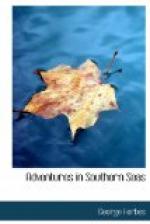Dirk Hartog, to whom I bade good-bye after the wedding, for his restless spirit was away again upon a fresh voyage, predicted I would one day become weary of inaction.
“If ever the roving spirit comes over thee, Peter,” he said as he wrung my hand at parting, “there’s always a place for thee aboard my ship. Travel once tasted is a lodestone that draws the spirit from the cosiest corner to fresh adventure.”
But at this I shook my head. “Here is my lodestone,” I said, and I pressed Anna to my heart.
But who can foretell the future, or predict the decrees of Fate?
CHAPTER XXVII
ONCE MORE TO THE SOUTH
Five years of wedded happiness followed my return to Amsterdam from my second voyage with Dirk Hartog into the Southern Seas.
I had now come to regard myself as being past the age of adventure. My income was large, my estate substantial; and the wealth I had brought back with me from the Island of Gems, shrewdly invested by my father-in-law, the Count of Holstein, enabled me to maintain a position compatible with the dignity of the noble family into which, through my marriage with Anna Holstein, I was admitted a member. Nothing, therefore, was farther from my thoughts and inclinations than a return to the life of peril through which, in my younger days, I had passed, when suddenly the blow fell which changed all my plans.
During the year 1630 an epidemic known as the “Black Death” raged through the Netherlands, and, as one of the victims to the fell disease, Anna, my wife, was taken from me. I followed her to the grave, and returned to my desolate hearth determined to die also. To this end I shut myself in the room which Anna had lately occupied, where I would permit nothing to be disturbed, nor would allow any to enter. Such food as I required was brought, by my orders, into an adjoining apartment, where I ate, when my appetite craved, in moody silence. Dust gathered. The air in the room became oppressive. I regarded this mournful chamber as my tomb.
My servants, and those who had called themselves my friends, avoided me. I heard whispers at my barred and bolted door, saying that I was mad.
A madhouse I knew to be worse than a prison. I therefore resolved to leave my home before I was prevented from doing so.
How long I had remained in the state of misery and dejection to which I had abandoned myself I cannot say. It must have been some considerable time, for when, at last, I came out into the light, the sun dazzled me. None offered to stop me when I left the house. Many of my one-time servants had been discharged by my father-in-law, who had taken upon himself the management of my estates. The gatekeeper looked at me curiously when I passed his lodge, and that was all the notice vouchsafed me by my former dependents.
I knew that Dirk Hartog had returned from the voyage upon which he had embarked soon after my marriage, and to him I determined to carry my broken heart. Only upon that mirror of mystery known as the ocean could I look for peace.




